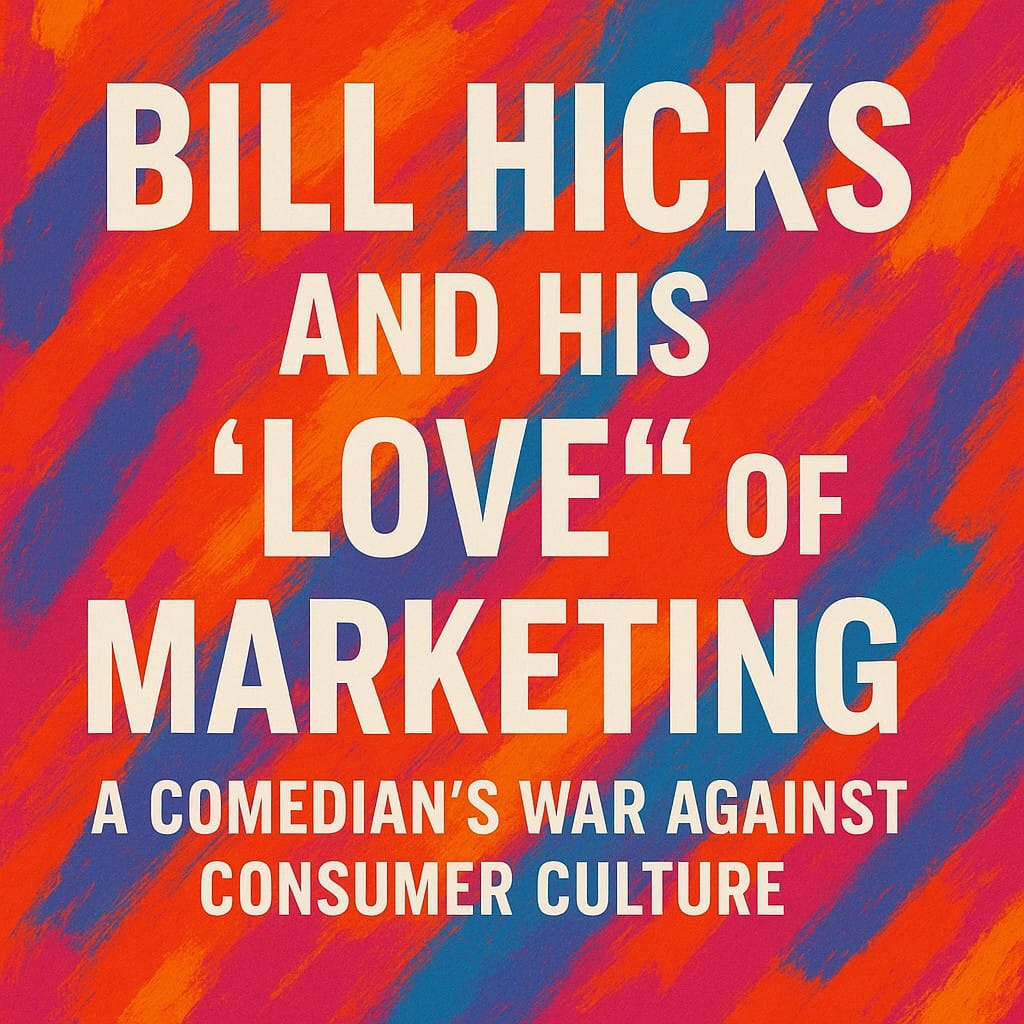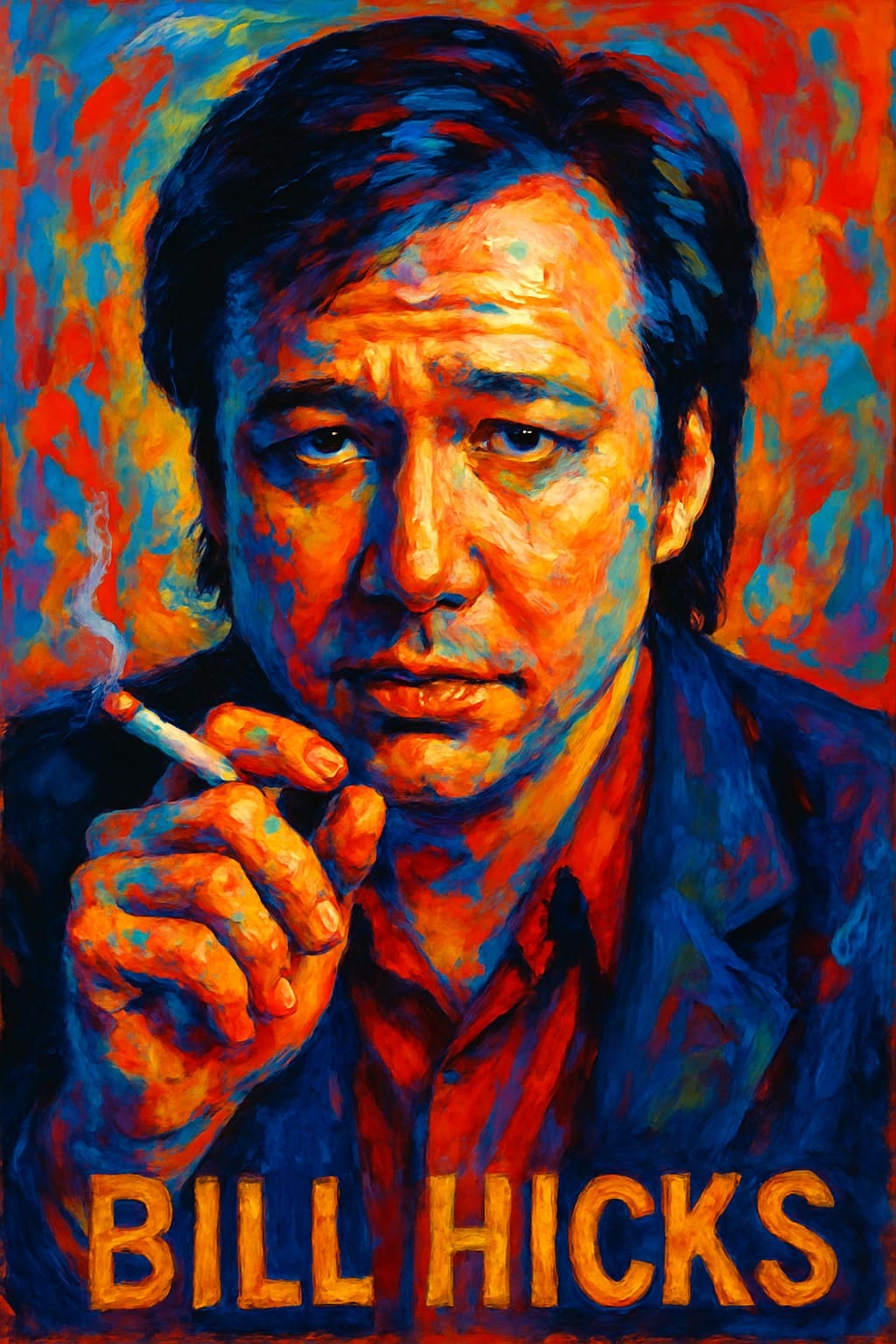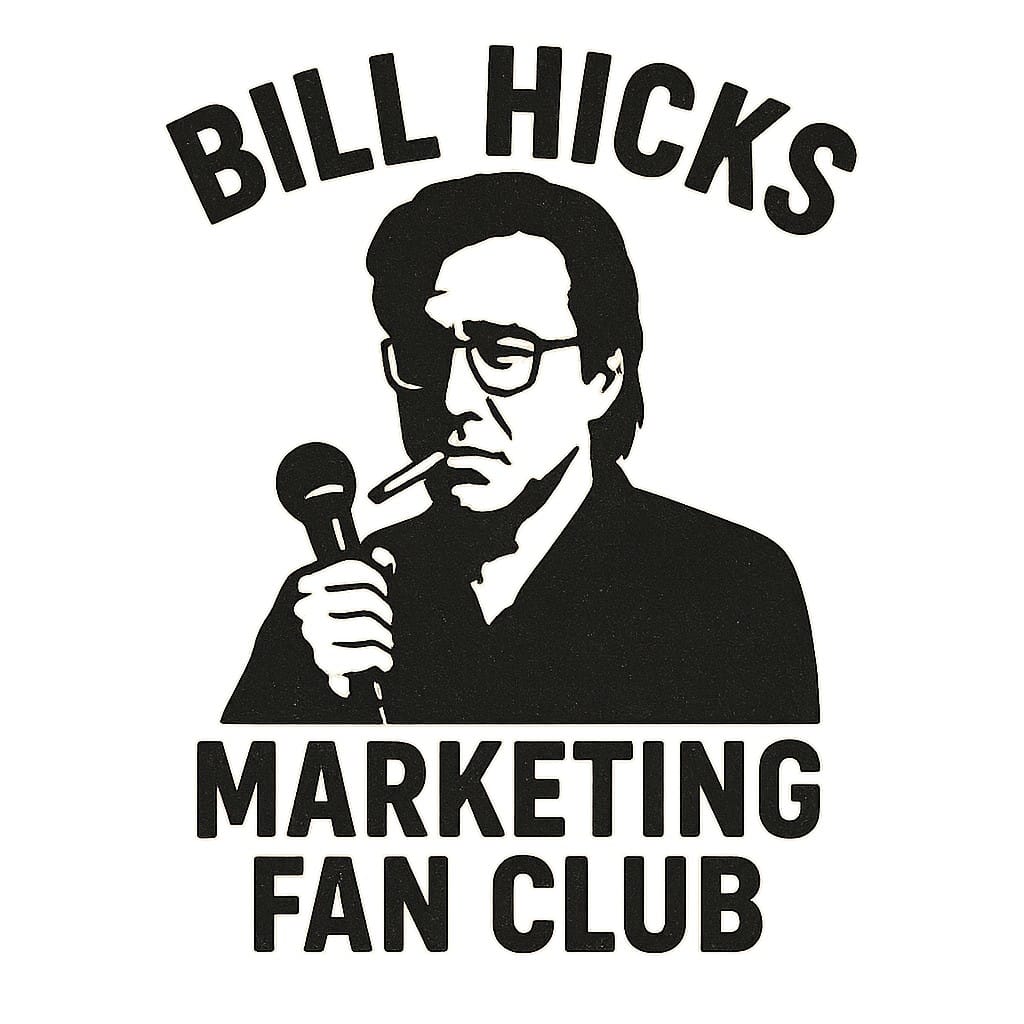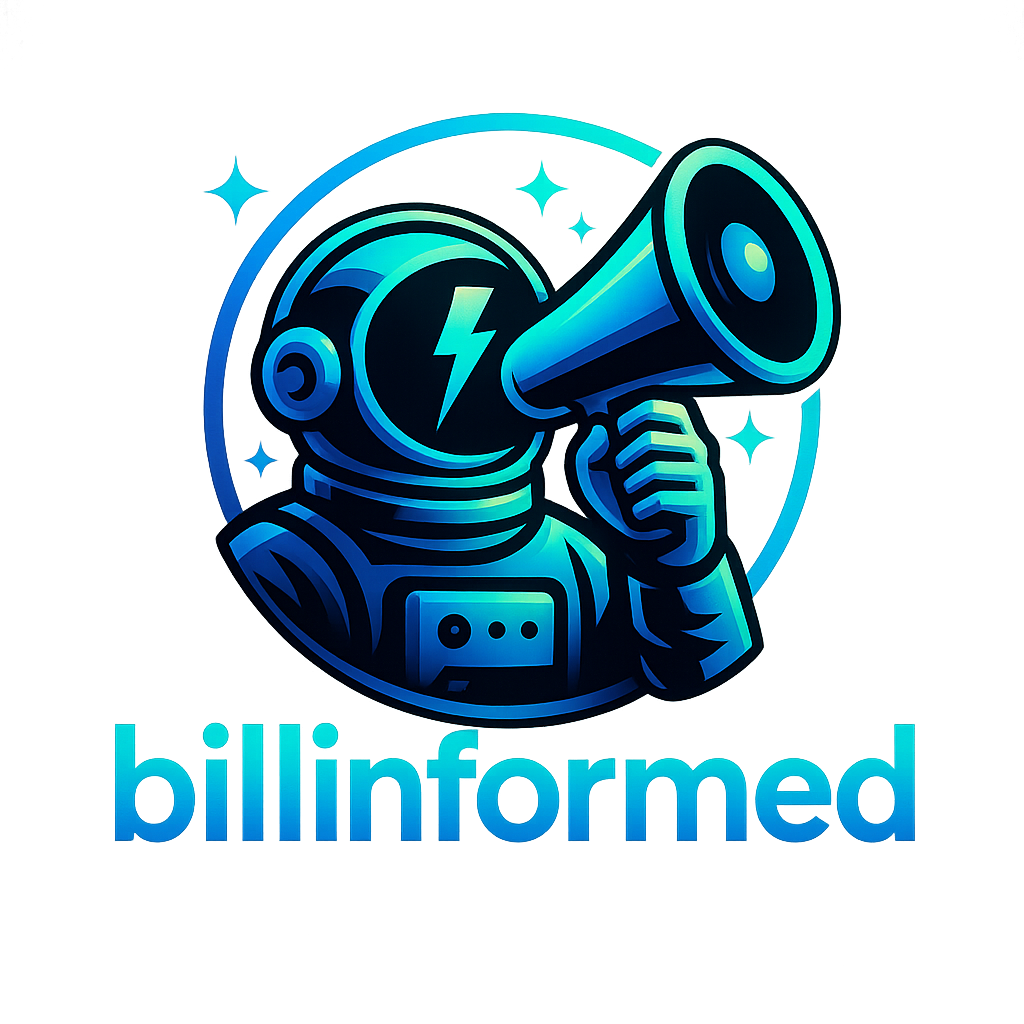
Bill Hicks loved marketing about as much as a vampire loves garlic-flavoured sunblock. Which is to say—he fucking despised it.
Few comedians have declared war on an entire industry with quite the ferocity that William Melvin Hicks brought to his decades-long crusade against advertising. The chain-smoking Texan treated marketing executives like they were personally responsible for humanity’s spiritual bankruptcy. And you know what? He probably wasn’t wrong.
But here’s the thing about Hicks and advertising—it wasn’t just professional antagonism. This was personal. Deep, philosophical, burn-it-all-down personal.
Growing Up in the Golden Age of Bullshit
Picture this: young Bill Hicks coming of age in Houston during the late ‘70s and early ‘80s. MTV’s launching. Cable TV’s exploding. Suddenly, there are more ways to sell people crap than ever before in human history.
Born in 1961 (Valdosta, Georgia, if you’re keeping track), Hicks got a front-row seat to watch American consumer culture hit its stride. The psychological advertising techniques were getting sophisticated. Lifestyle branding was becoming a thing. Everything—and I mean everything—was becoming a commercial opportunity.
For a kid with Hicks’ particular brand of intellectual curiosity and natural-born skepticism? This environment was a petri dish for cultivating rage.
He started doing stand-up while still in high school, cutting his teeth in those sweaty Houston comedy clubs. While his contemporaries were busy sanitizing their acts for TV consumption and corporate sponsors, Hicks went the other direction entirely. Harder. Angrier. More uncompromising.
Because here’s what he figured out early: the entertainment industry’s cozy relationship with advertising wasn’t just selling products. It was selling souls.
“Kill Yourself”: The Nuclear Option
You probably know the bit. Hell, if you don’t, you should—it’s become something of a sacred text among comedy nerds and anyone who’s ever wanted to throat-punch a marketing executive.
“If you work in advertising or marketing, kill yourself.”
Boom. Right out the gate, no warm-up, no safety net. “Thank you, thank you. Just a little thought. I’m just trying to plant seeds. Maybe one day they’ll take root.” The pause. The grin. “I don’t know. You try. You do what you can.”
Then he’d double down: “Kill yourself. Seriously though, if you are, do.”
Now, before anyone gets their panties in a twist—Hicks wasn’t advocating mass suicide among ad executives (though I suspect he wouldn’t have minded if a few of them took up different careers). This was shock therapy. Cognitive dissonance delivered via comedy club microphone.
“No, really, there’s no rationalization for what you do, and you are Satan’s little helpers, okay?”
The beauty of this routine wasn’t just the shock value—though watching audience members squirm was a bonus for Hicks. The brilliance lay in how he systematically dismantled every possible defence an advertising person might offer.
“You’re going, ‘There’s going to be a joke coming.’ There’s no fucking joke coming, okay?”
And there wasn’t. This was Hicks at his most serious, using humour as a delivery system for genuine moral outrage.

The Psychology of Soul-Crushing
But let’s dig deeper, because Hicks wasn’t just throwing around insults for shits and giggles. The man understood advertising psychology better than most people working in the industry.
He’d riff about how marketers weaponized human insecurity. Creating problems so they could sell solutions. Making people feel inadequate so they’d buy their way to happiness.
“You know what really gets me about advertising?” he’d ask, setting up another devastating observation. “They show you these perfect families—perfect kids, perfect house, perfect fucking everything. If life was actually like that, why would we need their products?”
Classic Hicks logic. Simple. Brutal. Irrefutable.
What made his critique so cutting was how he connected the dots between advertising techniques and broader patterns of social control. Marketing and political propaganda? Same playbook, different product.
The goal wasn’t just selling stuff—it was manufacturing consent. Creating compliant consumers who’d look outside themselves for validation and meaning.
Consciousness vs. Commerce
Here’s where things get interesting (and where Hicks gets really dangerous to people trying to sell you things). His anti-marketing stance wasn’t just about protecting people from bad products or annoying commercials.
This was about protecting human consciousness itself.
Hicks believed—genuinely, deeply believed—that advertising was a form of psychological warfare designed to keep people asleep. To prevent the kind of awareness and authentic self-discovery that might lead someone to question not just what they’re buying, but how they’re living.
“The whole world’s become a fucking commercial,” he’d say, “and we’re just the target demographic.”
He was particularly savage about marketing aimed at kids. Saturday morning cartoon commercials programmed children to be consumers before they could even read properly. The way brand loyalty got sold as identity formation.
“They’re creating the next generation of perfect little consumers,” he’d rant, “teaching them that their worth as human beings is measured by what they own.”
And Jesus, has that turned out to be prophetic or what?
The Celebrity Sellout Special
Nothing—and I mean nothing—triggered Hicks’ rage quite like celebrity endorsements. This was where his artistic integrity met his anti-corporate fury, and the results were spectacular.
Musicians doing commercial jingles? That was a special circle of hell in Hicks’ cosmology.
“Here’s the deal, folks. You do a commercial, you’re off the artistic roll call forever. End of story.” He’d pause for effect, let that sink in. “You’re another corporate fucking shill, you’re another whore at the capitalist gang bang.”
Then came the imagined scenarios—rock stars trying to rationalize their commercial appearances, artists claiming they needed the money, the cognitive gymnastics of rebellion for sale.
This wasn’t just about purity for its own sake (though Hicks had some purist tendencies). He genuinely believed that art had a responsibility to challenge and inspire rather than pacify and sell. When artists became advertisements, they lost their transformative power and became tools for maintaining the status quo.
Pretty hard to argue with that logic, especially when you’re watching your favourite musician hawk credit cards or breakfast cereal.

The Unmarketable Man
Here’s the beautiful irony: Hicks’ anti-marketing stance made him completely unmarketable in any traditional sense. His refusal to tone down his message, his open hostility to corporate sponsors, his general antagonism toward the entertainment industry’s commercial machinery—it all made him a nightmare for network executives and venue bookers.
But that unmarketability became part of his brand (and yeah, the irony of using that word isn’t lost on me). In an era of focus-grouped, corporate-approved comedy, Hicks represented something increasingly rare: authentic artistic vision that refused to compromise for commercial success.
His authenticity was its own form of anti-marketing—attracting audiences hungry for someone willing to speak truth to power, even when that power controlled the microphones and the paychecks.
Prophet of the Digital Apocalypse
Looking back now, nearly thirty years after Hicks died (February 26, 1994, pancreatic cancer, age 32—way too fucking young), his warnings about marketing and consumer culture feel less like comedy bits and more like prophecy.
Social media advertising? Influencer culture? Algorithmic targeting based on psychological profiles? Data mining our personal information to sell us stuff we didn’t know we wanted?
This is precisely the kind of surveillance-capitalism nightmare that Hicks seemed to see coming. His jokes about psychological manipulation in advertising have become our daily reality—except now the manipulation is personalized, data-driven, and operating at a scale that would’ve blown his mind.
Contemporary comedians still cite Hicks as an influence, particularly his willingness to attack systems of power that most entertainers prefer to ignore. His anti-marketing philosophy has inspired everyone from Doug Stanhope’s anti-corporate rants to the culture jamming movements that emerged in the early 2000s.
The Love That Dared Not Sell Its Name
So yeah, Bill Hicks “loved” marketing the way a surgeon loves tumours—with professional fascination and an absolute commitment to cutting them out before they metastasize.
His relationship with advertising and consumer culture defined not just his comedic persona but his entire worldview. He didn’t see marketing as merely annoying or manipulative—he saw it as fundamentally evil, a corruption of human potential that reduced complex individuals to demographic data points and purchasing decisions.
In treating advertising as a worthy enemy—something dangerous enough to deserve serious analysis and sophisticated enough to require his full intellectual firepower—Hicks elevated comedy criticism into cultural resistance.
He didn’t just make fun of commercials. He diagnosed advertising as a symptom of deeper social pathologies and offered his audiences a different way of seeing and being in the world.
Whether people loved or hated his anti-marketing tirades, they couldn’t ignore them. And maybe that was the point all along: in a world increasingly dominated by messages designed to make us ignore our better instincts, Bill Hicks demanded that we pay attention, think critically, and never—ever—trust anyone trying to sell us something.
Especially if that something was ourselves.
I don't sell memberships or anything, but if you want to buy me a beer, I won't refuse.


